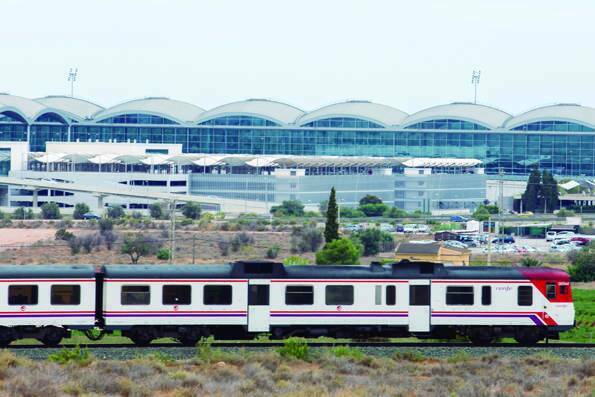Adif, the Spanish state-owned railway infrastructure manager that reports directly to the Ministry of Transport, Mobility and Urban Agenda, has set itself a deadline that points to, at least, the first quarter of 2026, to have the project for the railway connection with the Alicante-Elche airport drawn up.
Calls for an airport rail connection have been taking place for some time, gaining momentum this year, especially as currently Alicante-Elche Airport is the only European airport of its category where passengers who get off the plane cannot take the train to reach their destination.
The tender was published on Wednesday in the Official State Gazette (BOE), through which the entity that manages the Spanish railway infrastructure is looking for a company (or companies) that are in charge of drafting the project to build the platform and track for Phase I of the Torrellano bypass, intended to provide access to the El Altet airport. The contract is put out to tender for an estimated price of 2.67 million euro.
According to the deadlines established in the tender itself, Adif will open the envelope with the economic offer (41% of the final valuation) on November 3. Assuming that the deadline for submitting offers is not extended, and that the evaluation period for offers is not excessive, Adif could have an award proposal by the end of 2022 or the beginning of 2023. And it remains to add the time that, almost with total certainty, the potential resources presented by the discarded companies will add to these terms.
Assuming that the response to these resources does not annul the process and force it to restart, as happens on many occasions, the term would be extended for several more months almost with total certainty, which could take the final award to the first quarter of next year, in a conservative forecast. And from here, the execution period granted by Adif to the successful bidder comes into play: 38 months, more than three years.
Thus, if everything went well the first time, the railway entity could have the connection project with the airport between the first and second quarters of 2026. This explains why, despite going out to tender for 2.67 million euro, Adif has only budgeted half a million for such a need this year, more as a gesture than anything else, since the wording will not be definitively awarded (and therefore, it will not be necessary to start paying for it) until 2023 at the earliest.
Once the project has been received, a new tender would have to be launched to award the construction management and the execution of the works, in addition to other minor contracts related to the project, so that the start of the works (and therefore their completion and commissioning of the new connection) moves further back in time. The whole process could reasonably take from five years to a decade to complete, and the cost of the works (only Phase I, which is what this tender refers to) would be about 80 million.
The Minister of Transport, Raquel Sánchez, announced at the end of June, during a meeting with the President of the Generalitat, Ximo Puig, that her department planned to put out to tender this year the drafting of the project for Phase 1 of access to the airport, to connect it with Alicante. The announcement of the BOE fulfils the announcement of the minister, after years of passing from promise to promise and without reflection in the General State Budgets (PGE), but it does not hide that the new path is still a very distant future reality.
The mobility plan between Alicante and Elche and their areas of influence highlights that the connection of the airport with both urban centres is an action that will be carried out at least between the next 5 and 10 years (as an objective), and whose cost estimated is about 350 million euro. Parallel to the connection with the airport, the electrification of the connection between the Matola High Speed station with Alicante is estimated at 47 million.





